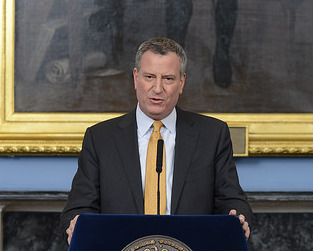De Blasio, in State of City, pledges to boost wages, continue pre-K and hospital battles
Calls for ‘A Fair Shot for Everyone’

deBlasio_NYC_cropped.jpg
Roughly a month after taking office, Mayor Bill de Blasio on Monday in his inaugural State of the City address at LaGuardia Community College, laid out a progressive agenda with a major emphasis on fighting the city’s increasing income equality gap.
Introduced by Fiorello LaGuardia’s granddaughter Katherine LaGuardia, Mayor de Blasio invoked the legacy of the beloved “Little Flower” while describing his vision, which he called “A Fair Shot for Everyone.”
De Blasio recapped initiatives already undertaken during his snowy first month in office, from launching the “Vision Zero” program to eliminate traffic fatalities, to introducing paid sick leave legislation benefitting 500,000 New Yorkers, to settling the legal battle over stop-and-frisk.
